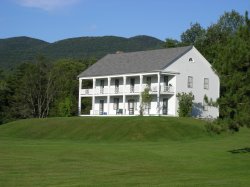August 20, 2007
MondayÂ
We were young, we were merry, we were very very wise,
And the doors stood open at our feast. . .
— Mary Coleridge, 1861-1907
English poet

Middlebury College is a private liberal arts school in central Vermont. The town from which it takes its name is New England picturesque, with a broad tree-lined common and a traditional white-steepled Congregational church opposite. The college property comprises many acres a few blocks west of the square with both traditional stone structures dating from the school’s founding in the nineteenth century and modern steel and glass buildings.
That’s not where I am. I’m at the Bread Loaf Mountain campus, a collection of white and ochre clapboard buildings on some 300 acres 12 miles east of (and a world above) Middlebury. The property was the gift of Joseph Battell, a 19th-century Vermont legislator and Morgan horse breeder who built the place as a public inn and a summer retreat for his friends. Bread Loaf is home to the School of English, a graduate program that meets for six weeks from June to early August, and the Writers’ Conference which follows, giving aspiring writers ten glorious days of peace, love, and manuscript critiques.
Because the School of English meets only in the summer (it takes five summers to complete a degree), it draws teachers, most of them beginners seeking advanced credits for permanent certification by their state boards of education. I was in my mid-twenties when I came here. Life at Bread Loaf was like life in a dorm without houseparents, parietal rules, or alcohol restrictions. There was always a crackling fire and a good conversation or two in the Barn, volleyball on the lawn, word games in the parlor (seriously). There was also no dearth of the fun and frivolity enjoyed by twenty-somethings everywhere. Romances began, and ended, here. I studied Renaissance and Victorian literature and took a whole course dedicated to a single book, Melville’s Moby Dick. I learned costume construction in the wardrobe room behind the Little Theater, and understood, for the first time, the forest scene in The Scarlet Letter because I sat in a pine forest to read it. In August of 1974, just days before we all left, I gathered with the others around a ten-inch television that got only shadowy reception and watched Richard Nixon resign. It was like a commune full of literature freaks, summer camp for the artsy-weirdsy.
There were also among us some “women of a certain age,” older students who had deferred their graduate education until their children were grown, or who were pursuing the M. Litt., (magister litterarum, Master of Letters) a specialized writing-intensive degree beyond the Master of Arts in English that most of us youngsters were going for. These women were housed not with the sometimes rowdy M.A. crowd, but in the white-columned building shown above. It stands on a hill above the volleyball field and parking lot.
The college calls it Tamarack.
We called it, may God forgive us, Menopause Manor.
From the first year I attended the Writers’ Conference in 2003, I chose to find accommodations off campus. I remembered the camp-like qualities of most of the rooms in the Bread Loaf buildings. All of them are shared. Most of them need some serious handyman work. I’m very set in my ways now, very much aware of just how much solitude I need to recharge my batteries. I am no longer willing to take a chance on a random roommate who might snore, have a ticking clock, talk to herself, or be unable to sleep without talk radio droning all night (as did the person who occupied the room across from mine last April at Wernersville). I don’t want to go down the hall to the bathroom or negotiate lights-out times with a stranger.
It occurred to me during my first conference that were I to return to the School of English for the M. Litt., I would now qualify for housing at Menopause Manor.
And, in a sense, I do live there. I rent a one-bedroom apartment attached to a private house that shares a driveway with Tamarack. Robert Frost stayed here with his friends the Morrisons, and I’ve seen a picture of him sitting on the porch with one of the Morrison children. I like to think he wrote “The Silken Tent” here. He didn’t, and the apartment I occupy was added long after his era, so he never stood inside this space. But perhaps he walked across it while it was still part of the lawn, and some part of his spirit lingers.
When I walked these grounds as a graduate student I was young but not particularly merry and certainly not wise. In those days I was depressed most of the time. My summers on the mountain were a respite from the unhappiness I felt in my school-year life. But loneliness ran like a shadow through those days, and if the doors stood open at a feast I only went as far as the threshold, too shy and uncertain to join the party.
I’m stronger and a lot more confident now. The Writers’ Conference is indeed a feast, and I am at last wise enough to come to the table every day.